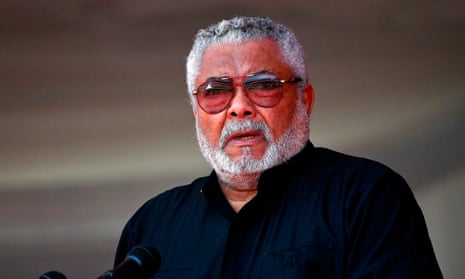Jerry Rawlings, who seized power twice in military coups but is now regarded as a driving force behind Ghana’s emergence as a stable democracy, has died, aged 73.
Ghana’s president, Nana Akufo-Addo, said in a statement that Rawlings had died on Thursday morning at a hospital in Accra after a short illness. “A great tree has fallen and Ghana is poorer for this loss,” he said.
Rawlings’ takeovers in 1979 and 1981 were marked by authoritarian rule and the execution of senior military officers, including Gen Frederick Akuffo, whom he overthrew in the first coup.
But Rawlings went on to oversee Ghana’s transition to multi-party democracy before stepping down in 2001. Today, Ghana is considered one of west Africa’s most mature democracies and regularly sees power change hands between its two main parties.
John Mahama, the leader of the National Democratic Congress (NDC) party that Rawlings founded, said on Twitter that he had suspended campaigning for the 7 December presidential election. The election will pit Akufo-Addo against his main challenger, Mahama, a former president who lost to the incumbent in a 2016 election, and other candidates from smaller parties.
The son of a Scottish father and Ghanaian mother, Rawlings first came to power in the 1979 coup when he was an air force lieutenant. He transferred power to civilian rule soon after, but then led another coup two years later, decrying government corruption and weak leadership. He ruled as chairman of a joint military-civilian government from 1981 to 1993.
Rawlings started out as a populist inspired by the leftwing policies of the Soviet Union and Cuba, but he eventually turned to the free market to boost Ghana’s suffering economy. As president, he liberalised the economy and encouraged investment in the oil and gold sectors.
He also heeded the calls for multi-party democracy that swept Africa in the early 1990s, and held Ghana’s first elections since 1979 in 1992. With all the levers of power at his disposal, he beat the opposition and claimed re-election four years later in 1996.
In 2001, he handed over power to John Kufour, of the opposition party, who had defeated Rawlings’ vice-president in the previous year’s election.
Rawlings remained a power broker in Ghanaian politics after stepping down, while serving in various international diplomatic posts, including the African Union’s representative in Somalia.
“Africa has lost a stalwart of pan-Africanism and a charismatic continental statesman,” the AU commission chair, Moussa Faki, said on Twitter.
A statement from the Nigerian president, Muhammadu Buhari, said: “The entire African continent will sorely miss the sterling qualities of the great leader.
“The passion, discipline and moral strength that the former Ghanaian leader employed to reposition his country over many years continue to reverberate across the continent and beyond.”
